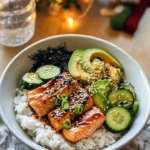Description
These Salmon Sushi Bowls are the perfect easy weeknight dinner! Featuring soy-ginger marinated broiled salmon, fluffy sushi rice, creamy avocado, crisp cucumber, and crunchy nori, these deconstructed bowls are PACKED with flavor. A drizzle of spicy sriracha mayo and a sprinkle of sesame seeds bring it all together for a delicious, homemade sushi experience – no rolling required!
Ingredients
For the Soy-Ginger Salmon & Marinade:
- 2 salmon fillets (about 6–8 ounces each, 3/4 – 1 lb total), skin on or off
- 2 tablespoons low-sodium soy sauce
- 1 tablespoon rice wine vinegar
- 1 tablespoon toasted sesame oil
- 2 cloves garlic, finely chopped
- 1 tablespoon freshly grated ginger*
- 1 tablespoon honey
For the Sushi Rice:
- 1 cup short-grain white rice (sushi rice), rinsed thoroughly
- 1 1/4 cups water
- 1 teaspoon kosher salt
- 1 tablespoon rice wine vinegar
- 2 teaspoons granulated sugar
For the Sriracha Mayo:
- 1/4 cup mayonnaise
- 2 tablespoons Sriracha (adjust to taste)
- 1 teaspoon rice wine vinegar
- 1 teaspoon low-sodium soy sauce
- 1 teaspoon honey
- Pinch of salt (optional, to taste)
For Assembly & Toppings:
- 1 ripe avocado, diced or sliced
- 1/2 cucumber, thinly sliced or diced
- 1–2 sheets nori (roasted seaweed), crushed or cut into strips
- Thinly sliced scallions (green onions)
- Sesame seeds (toasted or untoasted)
Instructions
-
Marinate Salmon:
- In a shallow dish, whisk together the soy sauce, rice wine vinegar, toasted sesame oil, finely chopped garlic, freshly grated ginger, and honey.
- Place the salmon fillets in the dish, turning them to coat evenly in the marinade.
- Cover with plastic wrap and refrigerate for 20-30 minutes.
-
Make Sushi Rice:
- While salmon marinates, rinse the short-grain white rice under cold water until the water runs mostly clear.
- Add the rinsed rice, water, and kosher salt to a rice cooker and cook according to manufacturer’s directions. (Alternatively, combine rice, water, and salt in a medium saucepan, bring to a boil, reduce heat to low, cover, and simmer for 15-20 minutes, or until water is absorbed. Let stand, covered, for 10 minutes.)
- Once the rice is cooked, fluff it with a fork. In a small bowl, stir together 1 tablespoon rice wine vinegar and 2 teaspoons sugar until the sugar dissolves. Gently fold this vinegar mixture into the cooked rice.
-
Make Sriracha Mayo: While the rice is cooking, make the Sriracha mayo. In a small bowl, whisk together the mayonnaise, Sriracha, 1 teaspoon rice wine vinegar, 1 teaspoon soy sauce, and 1 teaspoon honey until smooth. Season to taste with a pinch of salt and additional Sriracha or honey if desired. Set aside.
-
Cook Salmon:
- Preheat your oven’s broiler to high. Position an oven rack in the upper third of the oven (about 6-8 inches from the broiler element).
- Remove the salmon from the marinade (discard excess marinade) and place it on a foil-lined rimmed baking sheet.
- Broil the salmon for 8-10 minutes, watching carefully, or until the salmon is cooked to your liking (internal temperature of 135-145°F for medium to well-done) and the top is golden brown and caramelized. Cooking time will vary based on fillet thickness.
-
Assemble Bowls: Divide the prepared sushi rice among serving bowls. Top each bowl with a broiled salmon fillet (flaked or whole). Arrange diced avocado and sliced cucumber alongside the salmon. Sprinkle with crushed nori sheets, sesame seeds, and thinly sliced scallions. Finish with a generous drizzle of the Sriracha mayo. Serve immediately.
Notes
- Ginger: Freshly grated ginger provides the best flavor. You can often find tubes of ginger paste in the produce section as a convenient alternative.
- Sushi Rice: Rinsing the rice is crucial for removing excess starch, resulting in fluffy, distinct grains.
- Broiling Salmon: Keep a close eye on the salmon under the broiler, as it can go from perfectly cooked to overcooked/burnt very quickly.
- Toppings: Feel free to customize your toppings! Other great additions include edamame, pickled ginger, or a sprinkle of furikake.
- Storage: These bowls are best enjoyed fresh. Store leftover components separately in the refrigerator.
